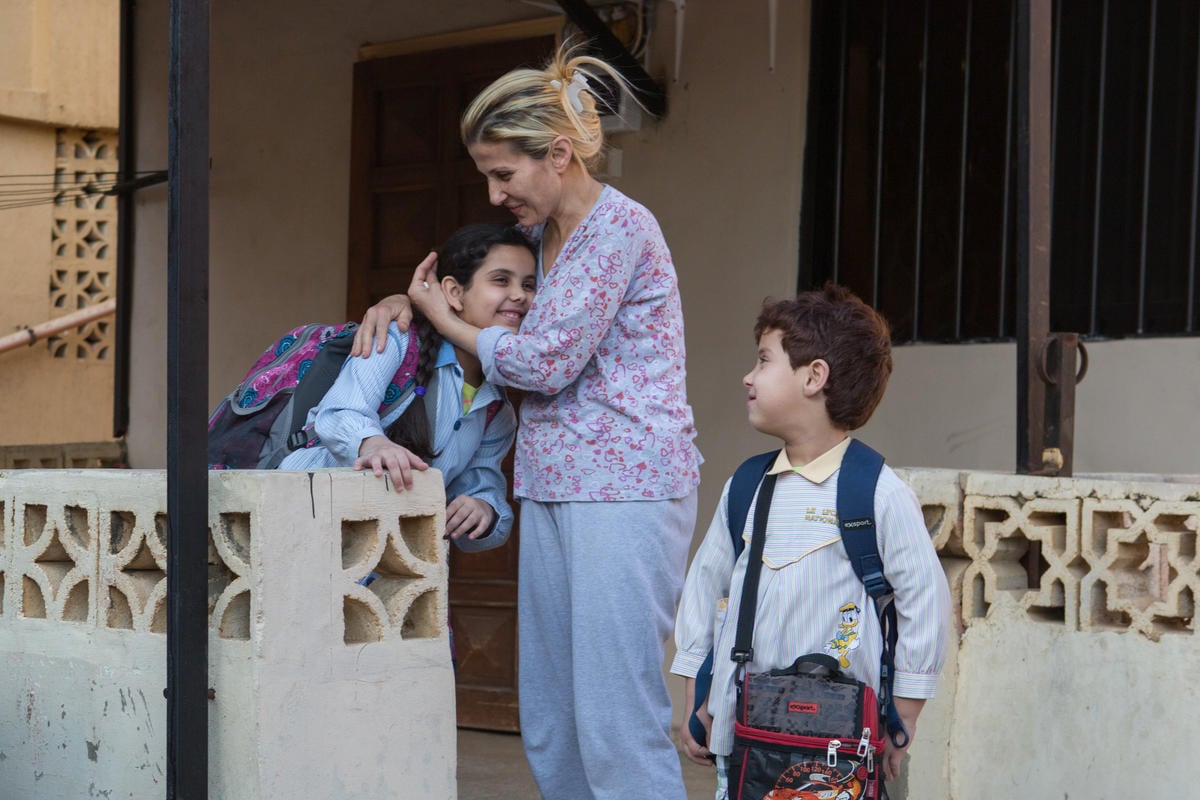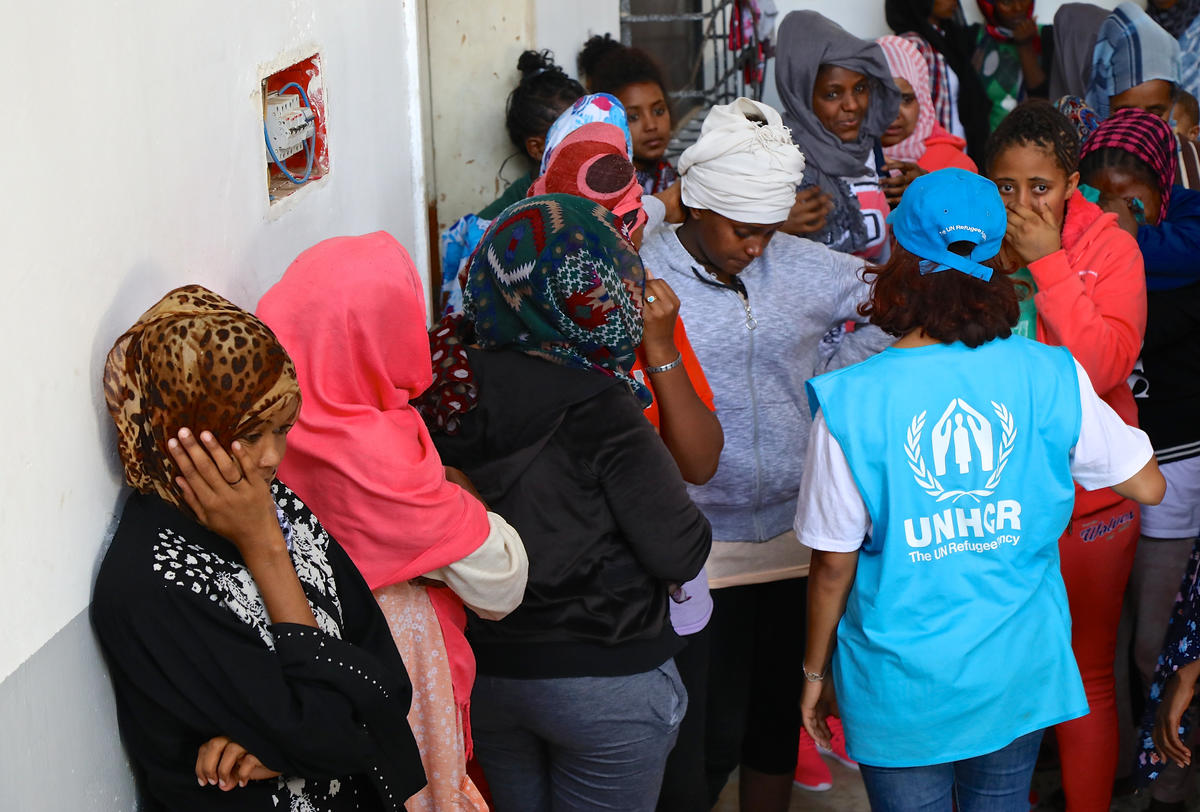World Refugee Day: UNHCR chief appeals to industrialized world as annual celebrations get under way
World Refugee Day: UNHCR chief appeals to industrialized world as annual celebrations get under way

GENEVA, June 20 (UNHCR) - As UNHCR celebrated World Refugee Day during the agency's 60th anniversary year, High Commissioner António Guterres appealed on Monday to industrialized countries to do more to help developing nations in dealing with huge refugee populations.
"We need a new deal in burden and responsibility sharing - much stronger support from countries in the north to countries in the south to help all those who crossed borders . . . The truth is, if there is a burden or responsibility it is essentially assumed by countries in the developing world," he said in the Italian capital, Rome, while presenting UNHCR's 2010 Global Trends report.
The annual report shows that the number of forcibly displaced people in the world is nearly 44 million - a 15-year high. It also reveals a deep imbalance in international support for the forcibly displaced, with 80 per cent of the world's refugees being hosted by developing countries.

In a separate World Refugee Day message, Guterres said it was time for individuals and states to recommit to the humanitarian values enshrined in the 1951 UN Refugee Convention. "We have to do more to keep borders open and guarantee access to fair asylum procedures everywhere," he stressed.
"We need to do more to promote peace in the countries that refugees come from and to support them to return home in safety and dignity," he said, adding: "We also need to increase the number of resettlement places in third countries so refugees everywhere can be restored to hope and the prospect of new lives."
The High Commissioner later presided over a World Refugee Day (WRD) event with Italy's President Giorgio Napolitano and six refugees, including a Polish survivor of the Holocaust in World War II.
Meanwhile UN Secretary-General Ban Ki-moon, in a special World Refugee Day message, called on "people everywhere to spare a thought for the millions of children, women and men who have been forced from their homes, who are at risk of their lives, and who, in most cases, want nothing more than to return home or to start afresh." Ban was later guest of honour at the Nansen Lecture in New York, which addressed forced displacement.
Even one refugee forced to flee, one refugee forced to return to danger is one too many.
UN Secretary-General Ban Ki-moon
Echoing a central message of a new UNHCR global awareness campaign launched last week, he added that "even one refugee forced to flee, one refugee forced to return to danger is one too many." UNHCR Goodwill Ambassador Angelina Jolie has supported the 1 campaign and her video message calling on people to "Do 1 Thing" is being broadcast today in countries around the world.
From Sydney to San Francisco, UNHCR and its partners, including governments, donors, non-governmental organizations, goodwill ambassadors and refugees themselves, are taking part in awareness-raising, cultural, educational, environmental and sport activities. Some held their main events at the weekend.
In keeping with past tradition, landmarks around the world are being illuminated in UN blue, including, for the second year in a row, the iconic Empire State Building in New York as well as the Colosseum in Rome, the Tokyo Tower and the world's largest civil administration building, in Romania.
WRD celebrations kicked off in the Asia-Pacific region. UNHCR's office in Australia hosted a community function in Canberra for about 150 people, including representatives of former refugee communities and refugee service providers. Members of the ethnic Mon and Karen communities - former refugees from Myanmar - performed traditional dances before the night wound up with a lively performance of African percussion rhythms by Zimbabwean drummer Gus Chinanai with the theme "come on all, come and join in" - which the crowd did with enthusiastic chants and clapping.
The highlight of the day in Japan, in more ways than one, was the illumination of the Tokyo Tower in the Japanese capital. The Eiffel Tower-like structure, painted white and orange to comply with air safety regulations, is 332.5 metres (1,091 feet) high. In Indonesia, some 300 refugees took part in a special WRD event in the Javan city of Bogor, which included drawing and colouring competitions for the young, as well as sack races. The adults competed in cooking and flower decorating contests.
Meanwhile, more than 200 people attended the screening in Bangkok, Thailand, of an award-winning documentary about two refugee families from Myanmar and their journey from a Thai border camp to a new life in the city of Sheffield in England. "Moving to Mars" was filmed in Mae La Camp, where the families lived for nearly 20 years. It was the highlight of a special refugee film festival. Audience members later told UNHCR resettlement experts that they now felt more sympathy for refugees.
In neighbouring Myanmar, UNHCR held a special WRD event for the first time in the capital, Yangon, with about 100 guests watching Jolie's special message and awareness videos and talking to staff. Nearby, in Bangladesh, traditional sports and cultural activities were held in two camps for ethnic Rohingya refugees from Myanmar and four schools rehabilitated by UNHCR. Monsoon rains did not dampen the spirits of those taking part.

Across the sub-continent in Pakistan, some 400 people attending a special event in Islamabad's National Library were dazzled by songs, theatrical performances, dances and a display of national costumes by refugees from Afghanistan, Somalia, Iran and Iraq. Minister for States and Frontier Regions Shaukat Ullah spoke on behalf of the government.
In Central Asia, UNHCR and the Kazakhstan government on Monday signed a memorandum of understanding aimed at protecting the rights of refugee women in the country.
World Refugee Day was marked in camp and urban settings across Africa. In the Ugandan capital, Kampala, hundreds attended the third and last day of a three-day bazaar in Kampala's newest mall and watched a parade through the city. Several restaurants again offered exotic WRD menus, including crocodile ribs in pineapple and chilli sauce, with the profits going to refugee projects.
In the Central African Republic, refugees and local actors took part in a theatrical drama to call for greater solidarity and commitment to refugees.
In the Democratic Republic of the Congo, more than 800 people gathered in Kintambo stadium to celebrate World Refugee Day with urban refugees living in the capital. After the official ceremony, refugee women played a popular Congolese game called nzango. Later, a UNHCR team took on and narrowly beat a refugee side at football. UNHCR also helped organize events in the cities of Bunia and Kisangani, which were attended by students and teachers.
Meanwhile, many staff members at the Geneva headquarters of UNHCR spent part of their Monday morning dancing in the atrium to the music of a five-piece band led by a former refugee. Jackson Wahengo was born in a refugee camp in Zambia in 1978 and repatriated to Namibia, with UNHCR help, in 1989. Buses and trams in the streets of Geneva as well as cruise ships on Lake Geneva are carrying UNHCR flags.
In the Romanian capital of Bucharest, the massive Palace of the Parliament was lit in blue on Monday for the first time. The building, which contains both chambers of the Romanian parliament, is the largest civilian administrative building in the world.
Also on Monday, UNHCR and Ministry of Interior officials will take part in a debate on refugee integration in Romania, which hosts a special evacuation transit centre for refugees under threat. And the flag carrier, TAROM, will from today feature Jolie's WRD message on all its flights for a month.
The United Kingdom will celebrate WRD-linked arts, cultural and educational events during its annual Refugee Week, which started yesterday. The focus Monday was in London, where Home Secretary Theresa May welcomed a small group of refugees or former refugees for tea. The six arrived in the UK in different decades over the past 60 years.
UNHCR's office in Strasbourg, France, meanwhile, opens a three-day "living library" in the parliamentary assembly of the Council of Europe. This will gather refugees, asylum-seekers and stateless people who can be borrowed by the public, like a library book, for a limited period of time, during which the "reader" finds out about their history.

And in Sweden's largest and busiest railway station - Stockholm Central - travellers and locals could visit a miniature refugee camp built from tent-shaped cards, and a big UNHCR tent.
The Americas were beginning to wake as this article went to press, but events planned include a concert in the evening at the Kennedy Centre in Washington, DC, by sisters Siham and Iman Hashi. The former Somali refugees form the group "Sweet Rush." An exhibition, "Nowhere People," by award-winning photographer Greg Constantine, is also featured.
In New York, the landmark Empire State Building was bathed in blue for several hours on the night of Monday. Also in the Big Apple on Monday, senior UNHCR official Udo Janz took part in the Nasdaq closing ceremony.
In neighbouring Canada, a full programme of events will be organized across the country. In Toronto, the CN Tower will be spotlit blue.
In South America, UNHCR Goodwill Ambassador Osvaldo Laport shared a barbecue with refugees at an event in La Boca, Argentina. In Bolivia and Chile, refugees participated in craft fairs and cultural performances together with host communities. Meanwhile, the Uruguayan and Argentine Foreign Ministries organized a joint event to pay tribute to former UNHCR officers, Oldrich Haselman and Guy Prim, who helped save many refugees in the region in the 1970s.
By Leo Dobbs in Geneva








